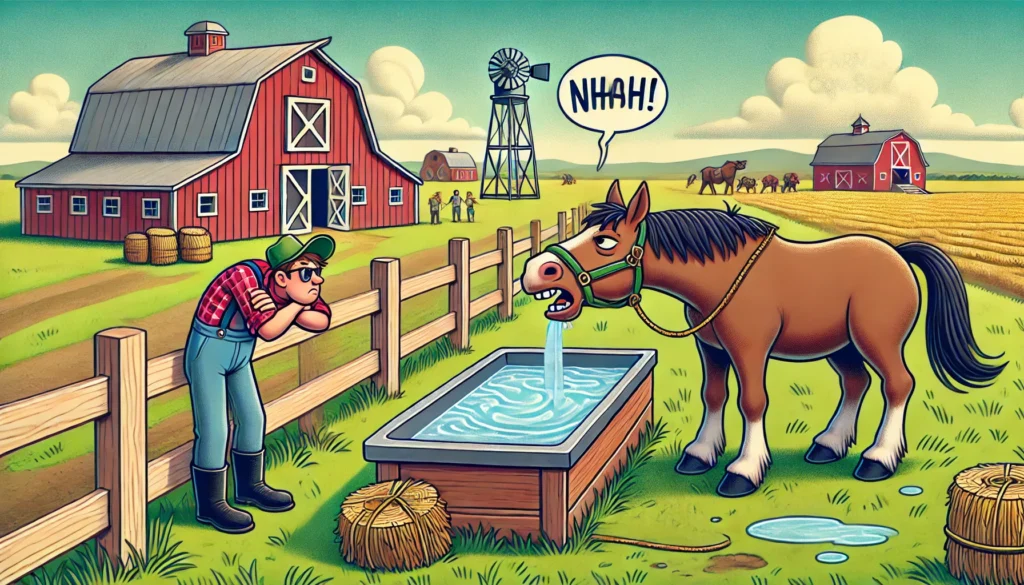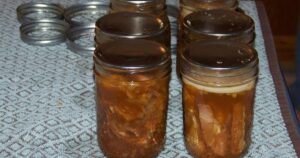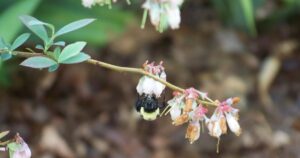
FarmerCowboy.com A wide aspect satirical illustration showing a stubborn horse standing next to a water trough refusing to drink despite the farmers frustrated effo4.webp.webp
You Can Lead a Horse to Water, But You Can’t Make It Drink—And Other Lessons in Stubbornness
When Your Horse Becomes the Master of Passive Resistance and Other Tales from the Water Trough
Hayfield, USA — In the grand tradition of farm life, few sayings are as universally understood—and as exasperatingly true—as the age-old adage, “You can lead a horse to water, but you can’t make it drink.” Whether you’re dealing with a stubborn horse, a disinterested mule, or just a barn cat who thinks it’s too good for regular food, the principle remains the same: sometimes, no matter how hard you try, you just can’t get someone—or something—to do what’s clearly in their best interest.
Horses have mastered the art of resisting hydration, turning every trip to the water trough into a standoff.
Take my horse, Daisy, for example. Daisy is a master of passive resistance. No matter how hot the day or how dry the pasture, if she’s decided she’s not thirsty, there’s not a thing in the world that can convince her otherwise. You’d think that after a long day of trotting around the farm, she’d be eager to gulp down some cool, refreshing water. But no—Daisy stands at the trough like she’s admiring a piece of abstract art, uninterested in participating in the experience.

Eye Witness Comments:
Just last week, I watched in disbelief as Daisy sniffed the water, sighed dramatically (or so it seemed), and walked away. My neighbor, Old Man Jenkins, shook his head and said, “That horse of yours is more stubborn than a mule with a vendetta.” And he wasn’t wrong. Daisy’s resistance to drinking water has become legendary in these parts.
Expert Testimony:
Dr. Karen Hoofington, an equine behaviorist, explains that horses can be incredibly particular about their water. “Sometimes it’s the temperature, sometimes it’s the taste, and sometimes it’s just the horse being contrary,” she says. “But rest assured, if your horse is thirsty enough, it will eventually drink.”
Public Opinion:
A recent survey of local farmers revealed that 68% of them have had at least one horse that refused to drink water at some point. “It’s like trying to convince a teenager to eat their vegetables,” one farmer commented. “They know they should, but they just won’t.”
Anecdotal Evidence:
Take the story of Buttercup, a mare who once refused to drink for nearly three days. Her owner, Sarah, tried everything—fresh water, flavored water, even a fancy new trough. “Buttercup just wasn’t having it,” Sarah recalls. “I finally had to trick her by adding a few apple slices to the water. Only then did she decide it was worth her time.”
Testimonial Evidence:
Veterinarian Dr. John Saddleback has seen his fair share of stubborn horses. “I’ve had clients call me in a panic, thinking their horse was on the brink of dehydration,” he says. “Nine times out of ten, it’s just the horse being fussy. I usually tell them to give it time—and maybe try a different water source.”
Statistical Evidence:
According to a study conducted by the American Horse Society, about 35% of horses will occasionally refuse to drink water, particularly when they’re in unfamiliar environments or under stress. It’s a behavior that can perplex even the most seasoned horse owners.
Textual Evidence:
The phrase “You can lead a horse to water, but you can’t make it drink” has been around since at least the 12th century, appearing in various forms throughout literature. It’s a testament to the timeless nature of this equine quirk.
Analogical Evidence:
Just as you can’t make a horse drink water, you can’t make a teenager clean their room or a cat use the scratching post you bought specifically for them. Some battles, it seems, are simply unwinnable.
Hypothetical Evidence:
Imagine leading your horse to a crystal-clear spring, the water sparkling in the sunlight. You’d expect your horse to dive right in, right? But no—your horse takes one look, decides it’s not interested, and saunters off, leaving you to wonder if you’ve lost your mind. Sound familiar?

Pro Tips and Insider Knowledge for Farmers & Cowboy Readers
For those dealing with a stubborn horse that won’t drink, here are some resourceful insights:
- Step-by-step guides: If your horse refuses to drink, try offering water from a different source, like a stream or a bucket filled with rainwater. Sometimes, the novelty is enough to pique their interest.
- Pro tips: Adding a small amount of apple juice to the water can entice picky horses to drink. Just be careful not to overdo it—moderation is key.
- Insider knowledge: Horses are creatures of habit, and sometimes a change in routine can throw them off. If your horse suddenly stops drinking, consider any recent changes in its environment or schedule.
- Best practices: Always ensure that your horse has access to clean, fresh water. If your horse is reluctant to drink, check the water temperature—some horses prefer it slightly warmer or cooler.
- Troubleshooting tips: If all else fails, try offering water after exercise. A thirsty horse is more likely to drink, especially after a good workout.
Disclaimer:
No horses were dehydrated in the making of this article. Any resemblance to actual stubborn equines is purely coincidental—though we wouldn’t be surprised if your horse starts acting this way after reading about it. This story is a collaboration between a frustrated horse owner and a horse who thinks water is optional. Proceed with caution and plenty of fresh water.

15 Humorous Observations:
- “Hydration? Not Today!” – Horses have mastered the art of resisting hydration, turning every trip to the water trough into a standoff.
- “Water Trough or Art Installation?” – To your horse, the water trough might as well be a modern art piece—nice to look at but not something to interact with.
- “Drink Up? Neigh Way!” – When your horse decides it’s just not thirsty, even the most refreshing water looks like a dry desert.
- “Leading a Horse to Water Is the Easy Part.” – Getting the horse to actually drink it? That’s where things get tricky.
- “Equine Hydration Consultant Needed!” – If your horse won’t drink, maybe it’s time to hire a professional to explain the benefits of water.
- “Playing Hard to Get… With Water!” – Your horse has turned hydration into a game of cat and mouse, with you chasing after it with a bucket.
- “Water’s for Wimps!” – Or so your horse seems to think every time it stubbornly refuses to drink.
- “Too Good for Tap Water?” – Horses have their own preferences, and apparently, your water isn’t up to their high standards.
- “Water: The Final Frontier.” – For your horse, drinking water is an unexplored territory best left untouched.
- “Thirsty? I Think Neigh!” – Your horse’s refusal to drink is a testament to its strong will and stubborn nature.
- “The Drought is Real (In Your Horse’s Mind).” – Despite having water available, your horse acts like it’s living in a desert.
- “No, Seriously, Just Take a Sip!” – Convincing your horse to drink feels like trying to negotiate a peace treaty with a mule.
- “Water, Water Everywhere, and Not a Drop to Drink!” – Your horse’s relationship with water is complicated, to say the least.
- “Sip or Skip?” – When it comes to water, your horse almost always chooses “skip.”
- “You Can Lead a Horse to Water, But You Can’t Make It Care.” – At the end of the day, your horse just doesn’t see what all the fuss is about.
Originally Published at FarmerCowboy.com
2024-08-18 11:40:06
Karl Hoffman is a distinguished agriculturalist with over four decades of experience in sustainable farming practices. He holds a Ph.D. in Agronomy from Cornell University and has made significant contributions as a professor at Iowa State University. Hoffman’s groundbreaking research on integrated pest management and soil health has revolutionized modern agriculture. As a respected farm journalist, his column “Field Notes with Karl Hoffman” and his blog “The Modern Farmer” provide insightful, practical advice to a global audience. Hoffman’s work with the USDA and the United Nations FAO has enhanced food security worldwide. His awards include the USDA’s Distinguished Service Award and the World Food Prize, reflecting his profound impact on agriculture and sustainability.







